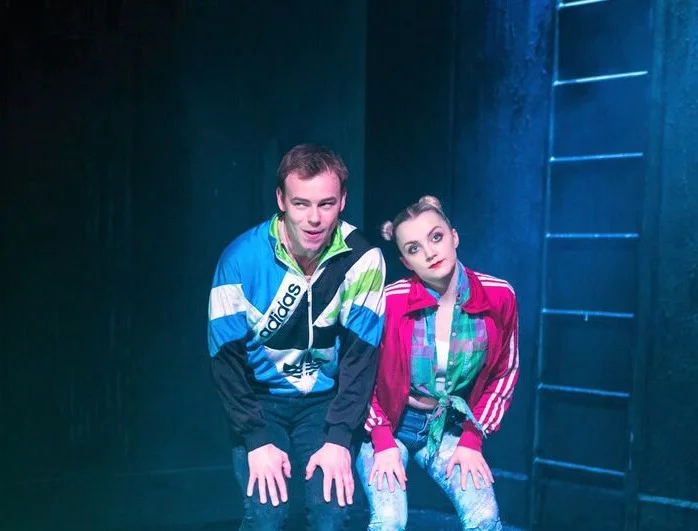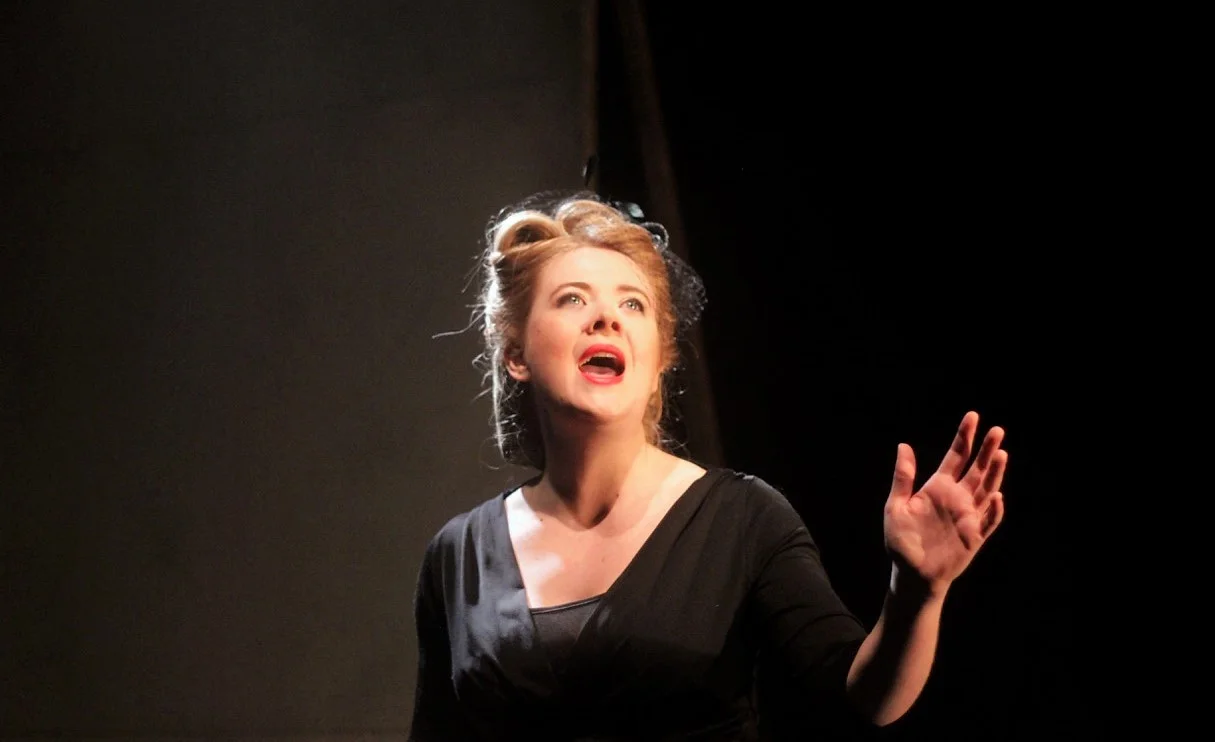Michael Weller’s lengthy program note for Jericho, a reworking of Ferenc Molnár’s play Liliom, acknowledges that it failed when first produced in 1909. He notes “it’s [sic] inventive and unexpected story, blend of crime, romance, fairy-tale” and “off-center mordant humor,” along with “a love story like no other I know of.” Audiences will recognize the plot of Carousel: Rodgers and Hammerstein took the play, which became a Theatre Guild hit in 1921, and used it as the basis for a more far-reaching success.
The Thing With Feathers
Scott Organ’s opening scene for The Thing With Feathers is deceptively creepy for anyone attuned to the dangers of the Internet. A young girl, Anna (Alexa Shae Niziak), is sitting on her bed, with paperwork around her, and she’s talking to a man named Eric—someone she has never met. They have clearly bonded online over poetry, particularly Emily Dickinson. They recite stanzas of Dickinson’s “Life” to each other: “For each ecstatic instant/We must an anguish pay/In keen and quivering ratio/To the ecstasy.” The voice gently probes elements of her home life and her relationship with her mother. The scene promises a literate, solidly structured drama, and it delivers.
A Kind Shot
In basketball, as Terri Mateer instructs in her solo show, a kind shot is one that touches nothing but net. No bouncing off the backboard, no clanging around the rim, just a sphere on a pristine trajectory that ends with a satisfying swish. Basketball was an integral part of Mateer’s high school, college, and young adult years, but the arc of her life was anything but clean. In an extended monologue that at times devolves into a bull session with the audience, then pivots into entertaining b-ball play-by-play, she recounts how the loss of her father gave way to a series of mentors, some wanting to help her, others wanting to help themselves to her. Though the dialogue could stand some tightening, and a director could help Mateer better realize the moments that call out for a pause, her saga, her stage presence and her intimate style of delivery bring home a win. The fact that her story is also one of outracing relentless sexual harassment, shows that her cultural timing is as strong as the pass timing of her youth.
X: Or, Betty Shabazz v. The Nation
X: Or, Betty Shabazz v. The Nation by Marcus Gardley is not only a portrait of Malcolm X, the optimistic and eloquent civil rights leader who was assassinated in 1965, but also of a dangerous and tumultuous time. In Gardley's play, time and place dissolve from one scene into another—a courtroom, the home of Malcolm (poignantly played by Jimmon Cole) and his wife, Betty Shabazz (Obie winner Roslyn Ruff), as well as the street; an office; and the home of Elijah Muhammad, leader of the Nation of Islam. In all the scenes Gardley focuses on a question that dominates the court: who killed Malcolm X?
The Undertaking
Now in their 17th year, The Civilians have etched out a unique place for themselves in the New York theater scene. Employing what they refer to as “investigative theater,” company members gather source material as journalists, then transform their research into art. In The Undertaking, two performers, portraying multiple characters, enact real-life interviews centered on the act of dying. Lip-syncing, film appreciation, a small warehouse of electronic devices and a pillow fort are all utilized as the characters take an inward trip to the hereafter and expound on shuffling off this mortal coil. All the while, the production comments upon itself and divulges its own techniques. Death may be the subject of this play, but its theme is creation.
Hindle Wakes
Stanley Houghton’s bracingly unsentimental Hindle Wakes failed twice on Broadway, expiring after 30-odd performances in both 1912 and 1922. In a new century, the Mint Theater Company is demonstrating that this little-known play with its perplexing title is a compelling period piece. Directed by Gus Kaikkonen and performed with unrelenting gusto, Hindle Wakes is likely to prove more enduring this time around.
Disco Pigs
Disco is one of those words that the senses respond to instantly with several very particular references: late 1960s or early ’70s New York City spring to mind. However, the world of Disco Pigs is a far cry from that, and disco assumptions are turned on their head. Enda Walsh’s play strips the term bare of its bright-lights, big-city ballroom connotations, throws a hefty dose of punk into the trunk, then turns off-road onto the aimless side of life. But it does so with deep, dark humor, wide-eyed invention and heaps of passion.
The LaBute New Theater Festival
The LaBute New Theater Festival is one of the rare times that one-acts get center stage (along with Author Directing Author, playwright Neil LaBute’s annual presentation of one-acts by him and Italian playwright Marco Calvani). The current trio of offerings provide two very strong entries and one, unfortunately, that isn’t. It’s the short-form champion’s own curtain-raiser that is the disappointment.
The Girl Who Jumped Off the Hollywood Sign
The Golden Age of Hollywood conjures ideas of glamour, romance and Technicolor hues—but behind the scenes, the reality of the industry wasn’t always the rosy picture portrayed on screen. These two sides of Hollywood’s past are now being explored in The Girl Who Jumped Off the Hollywood Sign, a one-woman show that transports the audience back to the Hollywood of yore.
Mankind
Robert O’Hara’s new play, Mankind, opens with a gay couple’s strained pillow talk, as one man, Jason (Bobby Moreno), advises his partner, Mark (Anson Mount), that he is pregnant—by Mark. From that simple start O’Hara spins a broad, futuristic satire of sexuality, feminism, religion, commerce and talk shows. It’s more than the playwright is able to manage smoothly, and much of it feels familiar, but it has its moments before it arrives at its circular ending, one reminiscent of Ben Hecht and Charles MacArthur’s Twentieth Century.















